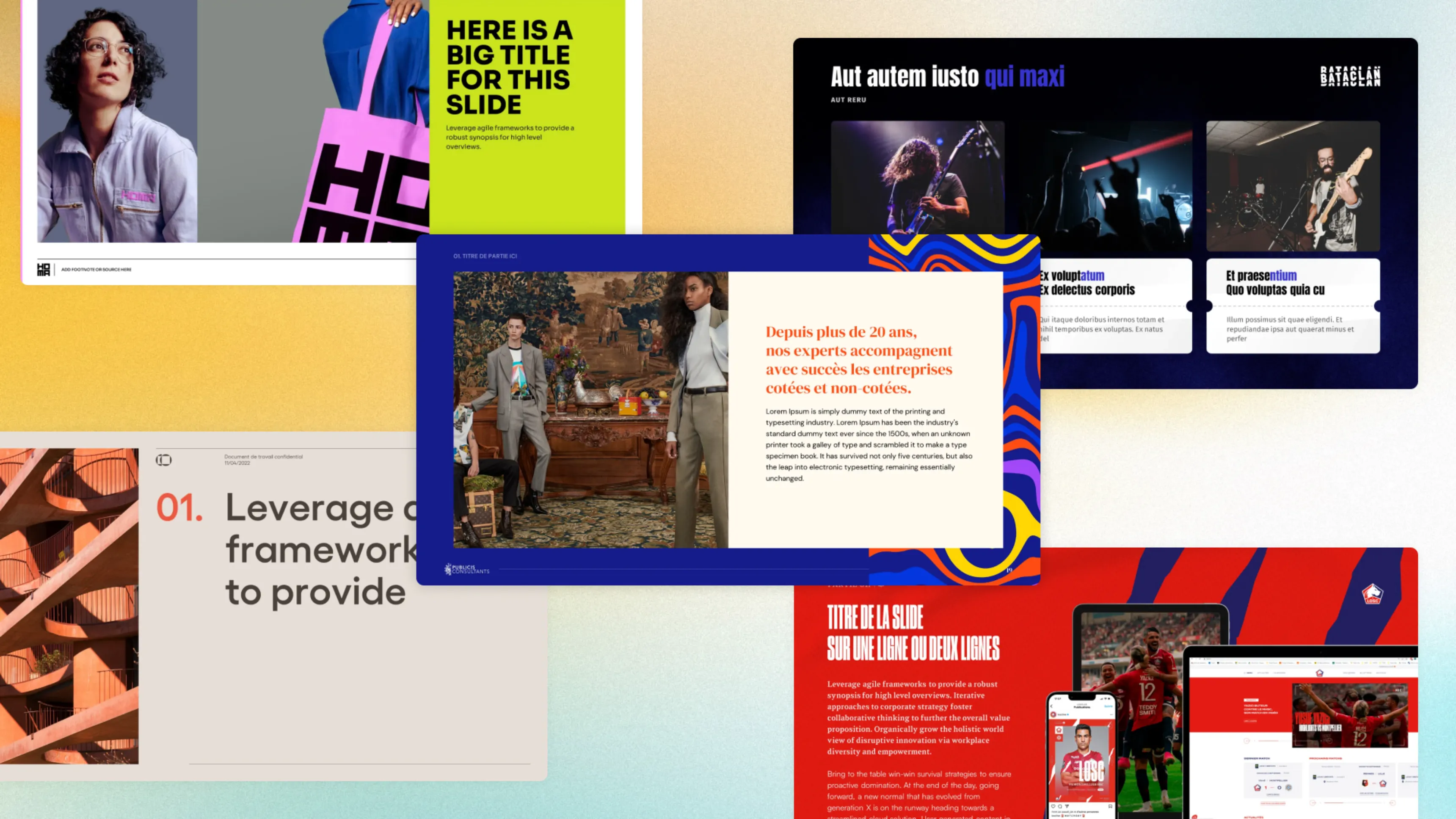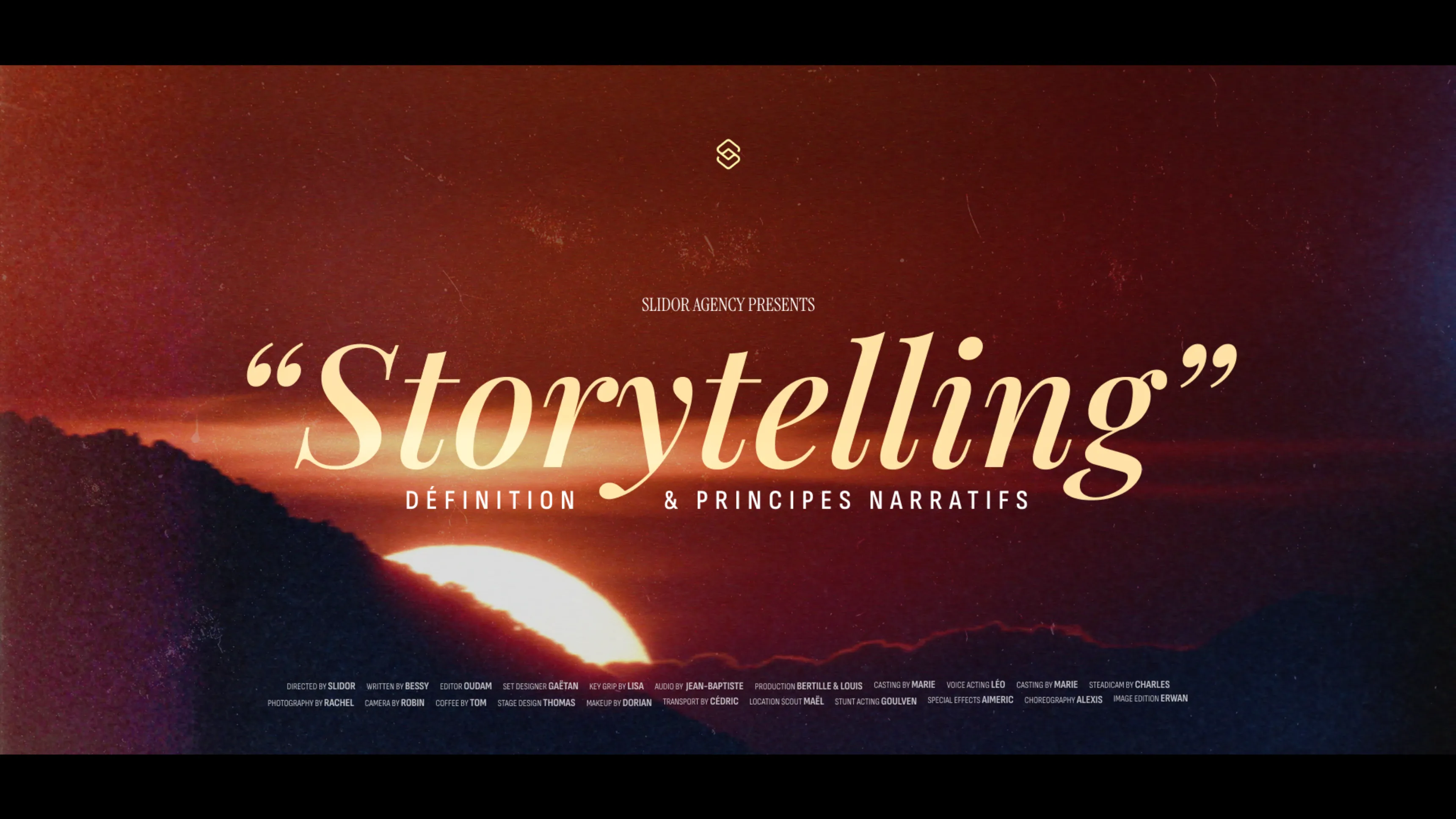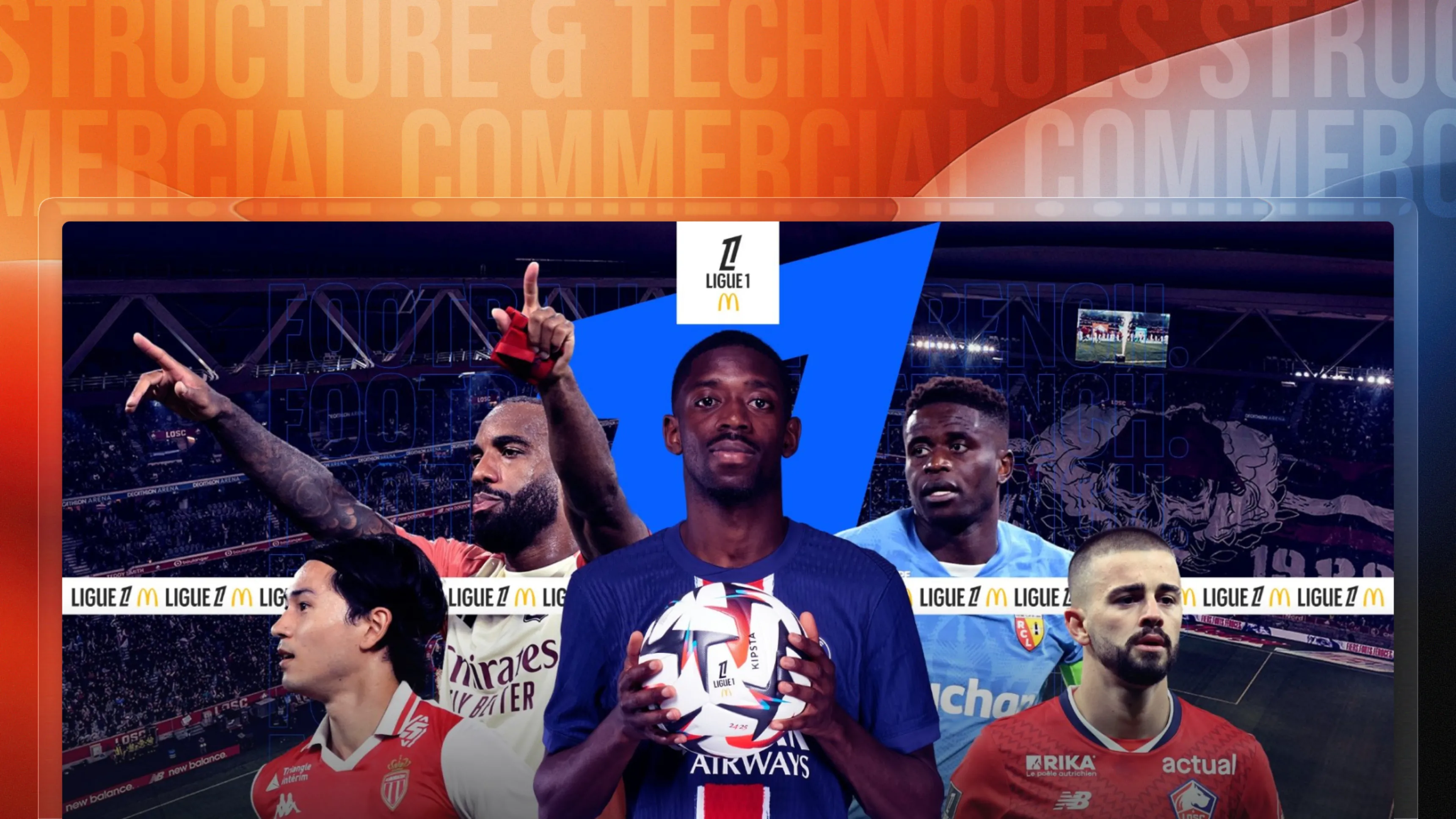.svg)
The different types of PowerPoint templates and their professional uses
A PowerPoint template is a pre-designed model that defines the visual structure, colors, fonts, and slide layout. It enables quick creation of consistent professional presentations by automatically applying uniform design across all slides, requiring no graphic design skills.


Join the thousands of businesses and executives who have trusted Slidor to turn their slides into high-impact presentations.



Definition of PowerPoint Template
A PowerPoint template represents much more than a simple blank document. Unlike a standard presentation (.pptx), a template serves as a reusable foundation that guarantees visual uniformity without repetitive manual effort. For demanding businesses, working with a professional presentation design agency allows you to create custom templates perfectly aligned with your brand identity.
Why Use a PowerPoint Template
Considerable Time Savings
Templates radically transform the creation process. A presentation that required 4-5 hours can be completed in 1-2 hours with an appropriate template. No more need to choose colors, fonts, spacing, or layouts for each slide.
| Task | Without template | With template | Savings |
|---|---|---|---|
| Choosing colors and fonts | 25-35 min | 0 min | 100% |
| Creating layouts | 30-45 min | 0 min | 100% |
| Formatting content | 60-90 min | 15-20 min | 75% |
| Total presentation | 4-5 hours | 1-2 hours | 60-70% |
Guaranteed Visual Consistency
Consistency reinforces professional credibility and facilitates message comprehension. Identically positioned logo, systematic corporate colors, and standardized typography create immediate recognition. Studies show that visual consistency increases message memorization by 30% and strengthens professionalism perception by 40%.
Team Standardization
Multiple people can work on different sections with guaranteed final consistency. The template already respects the graphic charter, eliminating aesthetic validation cycles. New collaborators immediately produce content that meets standards.
Template Examples by Sector
Corporate and Finance Templates

Visual appearance: Neutral palettes (navy blue, gray, white), readable sans-serif typography, generous spacing. Sober design highlighting data without distraction. The choice of colors and styles is crucial for conveying professionalism and credibility.
Characteristic layouts:
- Title page with space for logo and institutional baseline
- Agenda and timeline slides to structure meetings
- Layouts optimized for financial charts (bars, curves, pie charts)
- Comparative tables with automatic formatting
- Conclusion slides with call-to-action
Concrete example - Consulting firm: Streamlined template with 70% white space, Helvetica Neue font, dark blue (#1E3A5F) and light gray (#F5F5F5) palette. Includes 3 specific layouts for analysis matrices (BCG, SWOT, Porter) with predefined zones.
Concrete example - Investment bank: Ultra-sober design, Arial font, institutional colors only. 8 preconfigured financial chart layouts (revenue evolution, profitability analysis, capital structure). Automatic footer with regulatory mentions.
Creative and Agency Templates

Visual appearance: Vibrant palettes, pronounced contrasts, modern gradients. Expressive typography (Montserrat Bold, Bebas Neue) creating strong visual hierarchy.
Distinctive graphic elements:
- Abstract geometric shapes in background
- Full-screen photographs with semi-transparent text overlays
- Asymmetric spacing creating dynamism
- Subtle animations on section transitions
Concrete example - Design agency: Modern minimalist template with 60% images, Futura font, black & white palette with neon color touches (#00FF88). Portfolio layout in 3x2 grid for projects, client case slides with side-by-side before/after.
Concrete example - Tech startup: Bold design with gradients (purple #7B2FFF to blue #00D4FF), Poppins font, isometric illustrations. Storytelling layouts with visual timeline, statistics slides with XXL numbers (200pt), team layout with circular photos.
Medical and Scientific Templates

Visual appearance: Neutral palette favoring precision. Dominant white with medical blue accents (#0077B6) or health green (#2A9D8F). Serious typography (Georgia, Times New Roman).
Specialized layouts:
- Layouts for anatomical diagrams with legends
- Study results slides (statistical charts, data tables)
- Protocol slides with step numbering
- Formatted bibliographic reference pages
Concrete example - University hospital: Sober white/blue template with medical logo. 12 layouts including: patient case (anamnesis, examinations, diagnosis), surgical protocol in 5 visual steps, results slides with box-plot charts. Readable Arial font 28pt minimum.
Concrete example - Pharmaceutical laboratory: Strict regulatory design. Mandatory footer mentions (8pt), palette limited to 3 institutional colors, pre-approved layouts for clinical trials (inclusion criteria, endpoints, statistics).
Educational Templates

Visual appearance: Stimulating colors without tiring (sky blue, soft green, soft orange). Very readable font (Comic Sans MS for children, Open Sans for adults). Educational iconography.
Characteristic elements:
- Question-answer zones with spaces for interaction
- Learning timelines with visual milestones
- Quiz slides with A/B/C/D options
- Exercise layouts with correction space
- Summary slides like "Key Takeaways"
Concrete example - Professional training: Clear template with white background, blue sidebar with module progress (slide 5/25). Layouts: learning objectives (checklist), theoretical content (2 columns), practical application (numbered steps), assessment (visual MCQ).
Real Estate Templates

Visual appearance: Design emphasizing purchase emotion. Large full-screen property images, elegant typography (Playfair Display for titles), luxurious neutral palette (beige #E8DDD0, gold #C9A959).
Specific layouts:
- Photo gallery (optimized 2x3 grid)
- Property sheet (features, price, location with map)
- Integrated site plans with dimensions
- Comparative property tables (3 columns)
- Neighborhood slide (shops, transport, schools)
Concrete example - High-end agency: Luxurious matte black template with gold typography. Signature layout: full-screen property photo with semi-transparent lower banner (price, area, rooms). Additional slides: 360° virtual tour, 3D plan, market price history.
Commercial and Sales Templates

Visual appearance: Persuasion-oriented design. Action colors (red, orange), directional graphic elements (arrows, diagonals), prominent numbers.
Strategic layouts:
- Eye-catching pitch title page
- Side-by-side problem/solution slides
- Customer testimonials with photos and quotes
- Commercial offer with pricing table
- Powerful final call-to-action
Concrete example - Commercial pitch: Dynamic red (#E63946) and dark gray template. Key layout: "Why us?" slide with 4 visual arguments (icon + title + 2 lines), satisfaction statistics in giant numbers (97% in 180pt), 6-step deployment timeline with colored milestones.
Essential Layout Types
Every professional template should include these fundamental layouts:
| Layout | Function | Characteristic elements |
|---|---|---|
| Title page | Presentation introduction | Main title zone, subtitle, logo |
| Title and content | Versatile standard slide | Title + flexible content zone |
| Section | Chapter separation | Section title, impactful design |
| Two contents | Side-by-side comparison | Title + 2 equal content zones |
| Content with caption | Commented visual | Large image zone + explanatory text |
| Title only | Quote or shocking statistic | Centered enlarged title, no distraction |
| Blank | Total creative freedom | No predefined placeholders |
Check out our detailed guide on creating a professional slide master to customize your templates.
Where to Find Quality Templates
Reliable free sources:
- Microsoft Office: hundreds of templates via File > New
- Slidor: free professional PowerPoint templates for commercial use
- FPPT and PresentationGo: decent free options
Premium marketplaces (€15-40):
- Envato Elements: subscription with unlimited downloads
- GraphicRiver: high-end individual templates
- Creative Market: creative and modern designs
Custom templates:
- Slidor: custom PowerPoint templates
Frequently Asked Questions
What is the difference between a PowerPoint template and a theme?
A PowerPoint theme (.thmx) only defines the overall visual appearance (colors, fonts, graphic effects). A PowerPoint template (.potx) encompasses a complete theme plus predefined slide layouts with positioned placeholders. The template offers a complete ready-to-use solution: use it to create a new standardized presentation. Apply a theme to quickly change the appearance of an existing presentation without modifying the structure.
How do I apply a template to an existing presentation?
Open your PowerPoint file then go to Design > Themes > Browse for Themes. Navigate to your template file (.potx or .pptx model) and select it. PowerPoint will instantly apply the template to all your slides. Warning: this operation may shift certain elements depending on structural differences. Systematically check each slide after application and manually adjust displaced elements.
How many layouts should a professional template contain?
A complete professional template should include between 8 and 15 different layouts. Essential layouts include: title page, title and content, section, two contents (comparison), content with image, title only, and blank slide. For specific needs (financial reports, creative portfolios, scientific presentations), add 3-5 specialized layouts such as data dashboard or image grid. The goal is to offer enough variety without overloading choice.
Can I modify a downloaded PowerPoint template?
Yes, you can modify most downloaded templates, but always check the usage license before modification. Free templates generally allow modifications for personal and commercial use. Premium paid templates usually offer a complete modification license. Access View > Slide Master to customize colors, fonts, logos, and layouts. Always respect license terms to avoid copyright issues.
How do I share a PowerPoint template with my team?
First save the template in .potx format via File > Save As. Then, place the file in a shared network folder accessible to everyone, or use a cloud platform (SharePoint, Google Drive, Dropbox). For optimal integration, ask users to copy the .potx file to their local templates folder (`Documents\Custom Office Templates`). The template will appear in File > New > Personal for everyone, ensuring standardized use throughout the organization. Check our guide to set a default template and automate its use.

.svg)


















